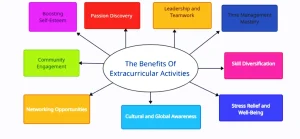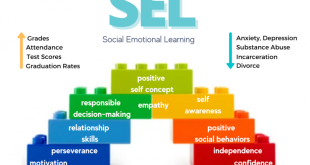Extracurricular activities play a vital role in the holistic development of students. These activities, which occur outside the traditional academic curriculum, encompass a wide range of pursuits, including sports, music, drama, student government, and community service. Engaging in extracurricular activities offers numerous benefits that contribute to students’ academic success, personal growth, and social development. This article explores the multifaceted advantages of extracurricular activities for student development.
 1. Academic Improvement
1. Academic Improvement
While extracurricular activities are often seen as separate from academic work, research suggests that participation in these activities can enhance academic performance.
a. Better Time Management
Students involved in extracurricular activities learn to manage their time effectively. Balancing schoolwork with sports, clubs, or other interests requires planning and prioritization. This skill translates into improved academic performance, as students become adept at allocating time for studying and completing assignments.
b. Increased Engagement
Extracurricular activities can foster a deeper engagement in school. Students who participate in clubs or sports often feel more connected to their school community, which can lead to increased motivation in their academic pursuits. This sense of belonging can significantly enhance their overall educational experience.
c. Development of Study Skills
Many extracurricular activities require students to engage in research, practice, or preparation, which helps them develop valuable study skills. For instance, participating in a debate club can improve critical thinking and analytical skills, while joining a music ensemble can enhance discipline and focus.
2. Social Skills Development
Engaging in extracurricular activities provides students with opportunities to develop essential social skills.
a. Teamwork and Collaboration
Many extracurricular activities, especially sports and group projects, require teamwork. Students learn to collaborate with peers, resolve conflicts, and work towards common goals. These experiences foster interpersonal skills that are crucial in both academic settings and future workplaces.
b. Building Friendships
Extracurricular activities create a platform for students to meet peers with similar interests, fostering friendships that can last a lifetime. These social connections can provide emotional support and a sense of belonging, which are especially important during challenging adolescent years.
c. Networking Opportunities
Participating in clubs and organizations can also help students build a network of contacts that may benefit them in the future. These connections can lead to mentorship opportunities, internships, or job references, providing valuable resources as students transition into higher education or the workforce.
3. Personal Growth
Extracurricular activities significantly contribute to personal development, helping students build character and resilience.
a. Leadership Skills
Many extracurricular activities offer students the chance to take on leadership roles. Whether as a team captain, club president, or project leader, students learn to lead and inspire others. These experiences cultivate confidence and help students develop their unique leadership styles.
b. Self-Discipline and Responsibility
Engaging in extracurricular activities requires commitment and responsibility. Students must attend practices, meetings, or rehearsals regularly, which instills a sense of discipline. This commitment teaches students the importance of accountability and reliability.
c. Exploration of Interests and Passions
Extracurricular activities allow students to explore their interests beyond the confines of the classroom. Whether it’s a passion for art, science, or athletics, these activities provide a platform for self-discovery. This exploration can guide students in making informed decisions about their future academic and career paths.
4. Physical and Mental Well-Being
Participation in extracurricular activities contributes to both physical and mental health.
a. Physical Fitness
Sports and physical activities promote physical fitness, which is essential for overall health. Regular exercise helps students maintain a healthy weight, improve cardiovascular health, and reduce the risk of chronic diseases. Furthermore, engaging in physical activities can enhance coordination, flexibility, and strength.
b. Stress Relief
Extracurricular activities provide a healthy outlet for stress. Engaging in hobbies, sports, or creative pursuits can help students decompress and improve their mental health. Physical activity, in particular, releases endorphins, which are known to reduce stress and anxiety levels.
c. Building Resilience
Facing challenges in extracurricular activities, such as competition or performance anxiety, helps students develop resilience. Learning to cope with setbacks and persevere through difficulties builds emotional strength and prepares students for future challenges in both academics and life.
5. Community Engagement
Extracurricular activities often encourage students to engage with their communities, fostering a sense of social responsibility.
a. Volunteer Opportunities
Many extracurricular programs include community service components, allowing students to give back and make a positive impact. Whether through organizing charity events, participating in environmental clean-ups, or tutoring younger students, these experiences help students develop empathy and a sense of civic duty.
b. Cultural Awareness
Participating in diverse clubs and organizations exposes students to various cultures, perspectives, and ideas. This exposure promotes cultural awareness and appreciation, fostering an inclusive mindset that values diversity.
c. Leadership in Advocacy
Students involved in extracurricular activities often become advocates for important issues, such as social justice or environmental sustainability. These experiences empower students to speak out about causes they care about, developing their voices as engaged citizens.
 Conclusion
Conclusion
Extracurricular activities play a crucial role in the comprehensive development of students. From enhancing academic performance to fostering social skills, personal growth, and community engagement, these activities provide invaluable experiences that extend beyond the classroom.
Encouraging students to participate in extracurricular activities not only enriches their educational experience but also prepares them for future challenges and opportunities. As educators and parents, supporting and promoting involvement in extracurricular activities can help cultivate well-rounded individuals who are equipped to thrive in an increasingly complex world. By investing in these experiences, we contribute to the development of confident, capable, and engaged citizens who will positively impact society.


